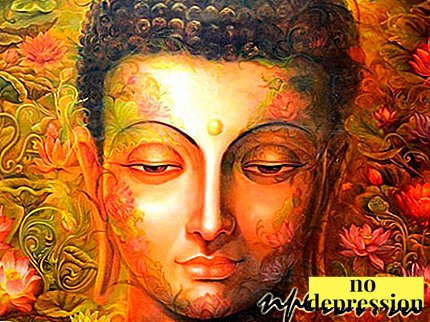Schizophrenia is called "a disease of our time". Indeed, this mental deviation is now widespread much wider than in any of the known historical eras.
But few people understand who a schizophrenic is, how he differs from a healthy person.
Of course to diagnose, including this one, can only be a specialist. But there are a number of features that distinguish such patients that any person is able to identify.
What is "schizophrenia"?

Schizophrenia - one of the three (along with paranoia and hysteria) major mental disorders.
Its essence - in breaking the patient's connections with the world, other people and even himself.
"Schizo" - in ancient Greek means "split" or "break off a piece." "Frenos" - "head", in a figurative sense - "brain", "thinking", "soul".
One of the most talented books about schizophrenia, written by the English psychiatrist Ronald Lang, is called "I Am Shattered."
A person feels healthy and full only when he is connected with other people, the world, is in contact and in a certain harmony with himself (with his inner world). Schizophrenia occurs due to the absence of these connections.
Such an internal state is extremely painful for the patient, interferes with his socialization, sometimes accompanied by painful symptoms associated with physical suffering, can make it dangerous to others.
Who is a schizophrenic? Who is assigned this label unnecessarily? Psychologist answers:
Psychology: how do they see the world?
Ronald Lang believes that the most important psychological feature of such patients is "ontological uncertainty". Every person in life has a number of tasks.
He has to find his place among other people, understand what he is, what he is, establish certain relations with people, decide who he likes, who does not, find his own business and achieve something in him, form his own worldview, become adult responsible person.
Facing these problems, prone to schizophrenia or already sick person passes, refuses to solve them.
"Ontological" uncertainty - it is uncertainty when solving the main problem of our life: self-identification, search for oneself, creation of oneself.
“The main passion of a person is to be, to be fulfilled, to develop as a person,” said the philosopher Merab Mamardashvili.
The psychopath is afraid of becoming a person, a person, an individual. He is afraid to take place. He leaves from the decision of this task. Sometimes he does this because avoiding a problem seems to him to be the best solution to the problem.
Sometimes he seems to himself too weak and insignificant, unable to solve it, and therefore avoids her. Sometimes he is afraid that some evil forces, people or social structures that have power over him will punish him if he becomes a person. However, in any case, as a result, he falls ill.
The core of his pathology is fear of the world and life. Because he himself feels weak, powerless, the world and other people seem to him completely separated from him, alien and even hostile, able to "devour", devour it.
He himself is also afraid of himself, that is, he is afraid to look inside himself, to understand what he really is. It is this - genuine contact with oneself - that the patient is most afraid of.
The lack of contact with their inner world psychiatrists call "alexitemia". Each of us understands himself with varying degrees of accuracy and objectivity, but we know how we feel at the moment and how we felt earlier, at key moments in our lives; we know what we want, what we strive for.
Although we may at the same time err in interpreting our motives, do not understand the origin of some of our emotions.
However, this misunderstanding is within the normal range. Schizophrenic knows almost nothing about himself.
He often speaks biased, even about his appearance. He does not know his true feelings and desires. Instead, he calls fantastic, often absurd, desires and experiences. To other people, he also attributes imaginary qualities and aspirations.
That is, the characteristic feature of schizophrenic - existence in a fantasy world, created by him, but accepted by him for real. But the real world, with its requirements and tasks, it fears in panic and in every possible way avoids.
How to recognize schizophrenia? Psychologist tips:
Can a great man be sick?
Many prominent people were called and called schizophrenics. Now, for example, they say that about Gregory Perelman, genius Russian mathematics.
It is known that he does not communicate with people at all, even with his colleagues, he lived his whole life with his mother (he is 51 years old), not trying to marry, often expresses incomprehensible, paradoxical thoughts, is extremely ascetic in everyday life.
 The same pathology was attributed, on the basis of some symptoms, Nikolai Gogol, Isaac Newton, Vincent van Gogh, Ernst Hemingway, Franz Kafka and many other great people.
The same pathology was attributed, on the basis of some symptoms, Nikolai Gogol, Isaac Newton, Vincent van Gogh, Ernst Hemingway, Franz Kafka and many other great people.
In this regard, the following should be noted.
The diagnosis is not public opinion, not the media, and the doctor. None of these people have had and do not have a documented psychiatric diagnosis.
"Schizo" is often called people with strange, unusual, incomprehensible behavior. And among talented, creative people there are really a lot of them. However, this does not mean that they are psychopaths.
In a certain sense, the usual European man in the street is closer to psychopathy, confident that he is normal, but Hemingway was a psychotic.
In fact, the writer was particularly sensitive, subtle, vulnerable person with a pessimistic worldviewHowever, he was distinguished by excellent working capacity and activity, was extremely sociable, had hundreds of friends and acquaintances. He was a much healthier man than those who consider him ill.
At the same time, a creative person can also get sick. However, we are entitled to assert that the percentage of psychopaths and people who are prone to psychopathy is much lower among such people than among those who are not engaged in creative work.
Obviously, creativity itself is good "cure" for this disease.
Symptoms and signs of the disease
Ronald Lang believes that the schizophrenic is afraid of certainty. He wants to seem (including even mostly - to himself) mysterious, incomprehensible, incomprehensible.
Example: in the famous children's fairy tale by Lyman Frank Baum "The Wizard of Oz" (known in our country as the "Wizard of the Emerald City", translated by A. Volkov) acts as a charlatan Goodwin.
 it small, weak and insignificant the man who managed to become the ruler of the Emerald City.
it small, weak and insignificant the man who managed to become the ruler of the Emerald City.
He never appears on people except under different masks, depicting him as scary beasts or magical creatures.
His city itself is ordinary, but all residents and guests, on pain of death, are ordered to wear, without removing, green glasses, which makes it seem "emerald." Although Goodwin is a literary hero invented by a writer, he has obvious symptoms of schizophrenia.
One girl, sick with this disease, told everyone that she really was not born on Earth, but on another planet, that she well remembers her home planet, and only there, on this planet, could she become what she was really
Such strange ideas, in which the patient himself unconditionally believes, very characteristic of this pathology (they are often called "schizophrenic delusions"). For reasoning patients characterized by incoherence, absurdity, or very strange logic.
So, one adult patient of 35 years old, who at the age of 22 married a genuinely loved her and, as she thought, the man she loved, but immediately after the wedding I ran away from my husband to my mother and stayed with herWhen asked by the doctor why she left her husband, she replied that she could not but leave her husband because he did not satisfy her sexually.
The doctor questioned the patient in detail about her sex life, found out that she was stormy and diverse, in recent years has come to naught, but the only pattern of the norm in her whole life was exactly the relationship with her husband.
But the most curious thing is that the patient left her husband for her mother, and not to another man. And since then lives with her.
That is, normal intimate relationships with her husband did not satisfy her, so she decided to live with her mother and not have permanent intimate relationships in general.
 Imagine a person who bought a beautiful apartment in Moscow, lived there for a month, after which he left, leaving the apartment, and settled in Yakutia, and to the question why he did not want to live in Moscow, who answered: “It’s too cold there”.
Imagine a person who bought a beautiful apartment in Moscow, lived there for a month, after which he left, leaving the apartment, and settled in Yakutia, and to the question why he did not want to live in Moscow, who answered: “It’s too cold there”.
But Yakutia is a pole of cold. Moscow, in comparison with it, is a very warm place. Such strange logic is characteristic of these patients.
When communicating with such a patient, a feeling of its closeness, non-contact is created. He does not answer directly to any question. His replicas logically unrelated to each otheror with replicas of the interlocutor.
Patients are closed, often refuse to communicate at all. They do not like to make independent decisions, leave them.
For patients characterized passivity, inactionoften even physical. Sometimes it all ends in a “catatonic syndrome”, when the patient lays all day and week without getting up, in the same posture, losing the ability to control her body.
Obsessive states are characteristic of the patient: recurring dreams or visions, strange, periodically recurring thoughts.
Let's say a sick woman often saw herself in a dream in a city, which, in her opinion, was Moscow (although at that moment, when she saw this dream for the first time, she had never been to Moscow).
She was always there on the same street where she was supposed to find a woman named Sophia. Neither the address, nor the name, nor her appearance, she did not know why does she need this Sophia, she also did not understand.
Despite this, the desire to find this Sophia by all means forced her to buy tickets to Moscow several times, to go around the huge city in search of that very street, but, p, she did not find either the street, or, all the more, the mysterious Sophia. .
 The speech of the patient often makes an impression strange, confused, illogical.
The speech of the patient often makes an impression strange, confused, illogical.
He may forget ordinary words, but at the same time invent words that are not in the language.
Patients often incomprehensible handwritingwhich they themselves can not make out, and this is not the result of negligence: they write diligently and even beautifully, but in such a way that nothing can be understood.
Why don't schizophrenics sleep? As with many other pathologies, with schizophrenia it is possible sleep disorder.
Sometimes the patient is afraid to fall asleep, as he is sure that it is in a dream that some kind of catastrophe can happen to him that he will not be able to prevent.
In relationships with people, schizoid psychopaths show alienation and warinessthey avoid close (spiritually, so often and physically) relationships, are not able to love and become attached, do not have feelings that are normal to people (for example, they are not upset by the death of loved ones).
They avoid informal contacts, never look into the interlocutor’s eyes, as they are afraid to be truly understood, seen and recognized as they really are.
How to distinguish from normal people?
This question worries many. The fact is that psychopaths many consider dangerous people. This is not true. These are the same people who need help. How do schizophrenics behave?
There is no method by which one can certainly distinguish a schizoid psychopath from a healthy person. Even experts sometimes find it difficult to do this.
Modern Society of Consumption schizoid in nature. It is organized as if specifically so as to provoke the greatest possible number of cases of schizophrenia.
The very fear of unusual, mentally ill people is a symptom of schizoid. Therefore, it is better not to try to diagnose yourself. If you suspect that your friend or family is sick or ill, consult a doctor.
Causes and provoking factors
Ronald Lang considers this a major factor. requirement of absolute obediencepresented to the child by his parents. In fact, parents demand: "Do not be yourself. Be our doll, our toy, which we will manipulate as we want."
 Another adverse factor is loneliness.
Another adverse factor is loneliness.
If no one loves a child, he is not the Only One in the World for anyone, he may end up sick.
Contribute to this disease alienated relationships with peoplein which there is no genuine interest in each other: people communicate in a purely functional way, seeing in each other not a goal, but only a means to achieve some alienated goals.
How to communicate with a schizophrenic and how to help him?
How to behave with a schizophrenic in the family? How to talk to him? You need to communicate with such a person in the same way as with healthy. At the same time not forgetting that you are dealing with a patient. That is, to control yourself well, if possible, not to be surprised at anything.
In no case can not be annoyed, scream, show aggressiveness. It is impossible to intrude intrusively into the inner world or the territory of such a person, for example, to enter without knocking into his room, even if it is a small child.
At the same time, one cannot indulge him in everything, one cannot allow everything to him, on the grounds that he is not the same as everyone else. Help schizophrenic even the best doctor cannot oppose his desire. If there is a desire to treat exacerbations, you need to follow the recommendations of the doctor: they are always individual.
Can he live alone?
In a sense, all schizoid psychopaths alone, internally alone. However, not all of them can serve themselves. It all depends on the stage of the disease.
If it is deep enough, the patient can stop eating (refusal to eat is also one of the symptoms of this pathology; for example, N.V. Gogol died for this reason) and die.
How to understand that you are schizophrenic? Can the patient himself understand that he is sick? Yes of course. Among schizoids a lot of very smart people. The problem is not inability, but unwillingness to understand oneself. Which is often peculiar to mentally healthy people.
 How much do schizophrenics live? No exact statistics.
How much do schizophrenics live? No exact statistics.
You can definitely argue that schizophrenics live on average a half to two times less healthy people.
This is due to their refusal to develop, the loss of a sense of the meaningfulness of life, the lack of communication and cheerfulness.
Their mental state provokes the emergence of a number of somatic disorders (cancer, for example), often - already at an early age. However, many schizophrenics live as much as healthy people.
Schizophrenia is truly a "disease of the century." For this reason, we also need to learn to treat schizoid psychopaths with understanding and sympathy. They are sick, but they are people.
They themselves are driving themselves into a cornerbut do it unconsciously. We will be able to help them only if we see in them, first of all, people just like ourselves.



